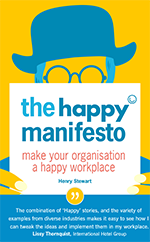Is it Time to Go Beyond Empowerment?
For years we’ve talked about empowering people to find their own route to an agreed goal. But is that enough? Does setting the goal itself limit the possibilities?
Given the three levels below, what can we do to move to self-management?
Hi, we are Happy
We are leading a movement to create happy, empowered and productive workplaces.
How can we help you and your people to find joy in at least 80% of your work?

Micro management: the manager tells the employee what steps to take to go from A to B
Empowerment: Point B is set by the manager, or agreed between manager and employee. “But you can choose how you get from A to B”
Self-management: The employee decides their own B, as well as how to get there.
In the excellent Reinventing Organisations, Frederic Laloux gives many examples of self-management. Indeed the book is dedicated to this new way of organising.
A great example he gives is from the power company AES. Newly hired Shazad Qasim wanted to return to Pakistan and research the potential for AES to provide electricity generation there. CEO Dennis Bakke was very doubtful and wouldn’t have himself approved it but, under AES self-managing rules, the decision was Shazad’s. He went back to Pakistan, created a new position for himself and, two-and-a-half years later, AES had a $700 million power plant built and creating electricity there.
That may sound a bit of a daunting example. So here’s a simple, small-scale one from my own company, Happy: When one of my colleagues, Natalie, took over credit control the amount owed from unpaid invoices stood at £135,000.
We sat down to agree targets for how much this could be reduced. I could have set a target for six months hence, a point B. Or we could have agreed one together. Or Natalie could have set it.
Instead I asked Natalie to send me a spread-sheet every fortnight, containing the key metrics (amount owed, 30 days, 90 days). And I asked her to include targets for each of these for two weeks later.
Her first targets were very optimistic and she didn’t achieve them. Her second set were very cautious and she easily beat them. But over time she became both increasingly accurate and very focused on achieving them. I never commented on the targets.
By the time she went on maternity leave nine months later, the amount owed had fallen to £35,000 – less than it had been for years and below any target I might have set.
Natalie had set her own point B (and reset it every two weeks). She had full ownership of it and how to achieve it and, as a result, did a great job of reducing how much we were owed.
What can you do to help people to set their own targets, their own point B?
Note: My thanks to Sandeep Khandelwal (of Abbott India), who inspired this post. He produced for me a moment of great clarity when he talked about the need to get people to define their own point B.
Related blogs
- 5 Questions With Simon Grosse of Foundation SP - The CEO of one of UK's Best Workplaces in the small business category cites empowerment and helping employees reach their goals as one of the key factors to their success.
- Pre-Approval: What is it and why should you do it? - Claire talks through the process of Pre-Approval, what it is, and what can be achieved by applying it.
- Pre-Approval in Practice at TLC: Talk, Listen, Change - In this short video Michelle Hill talks about how the charity TLC: Talk, Listen, Change has used pre-approval in practice.
Keep informed about happy workplaces
Sign up to Henry's monthly Happy Manifesto newsletter, full of tips and inspiration to help you to create a happy, engaged workplace.

Learn the 10 core principles to create a happy and productive workplace in Henry Stewart's book, The Happy Manifesto.
Henry's Most Popular Blogs
- 8 Companies That Celebrate Mistakes
- 9 Benefits of Having Happy Employees
- 321Zero: How I Solved my Email Overload
- 16 Companies That Don't Have Managers
- 5 Big Companies Who Swear by Mindfulness
- 49 Steps to a Happy Workplace
- A Four Day Week? Let's Start With a Four Day August
- Google: Hire Great People and Give Them Lots of Autonomy
- Buurtzorg: No Managers, Just Great Care From a Nurse-Led Service
- 30 Steps to Joy at Work: Get More Done by Being Less Busy

Henry Stewart, Founder and Chief Happiness Officer
Henry is founder and Chief Happiness Officer of Happy Ltd, originally set up as Happy Computers in 1987. Inspired by Ricardo Semler’s book Maverick, he has built a company which has won multiple awards for some of the best customer service in the country and being one of the UK’s best places to work.
Henry was listed in the Guru Radar of the Thinkers 50 list of the most influential management thinkers in the world. "He is one of the thinkers who we believe will shape the future of business," explained list compiler Stuart Crainer.
His first book, Relax, was published in 2009. His second book, the Happy Manifesto, was published in 2013 and was short-listed for Business Book of the Year.
You can find Henry on LinkedIn and follow @happyhenry on Twitter.
Next Conference: Women in Leadership Online Conference
Save the date for our online conference on 12th November 2025, celebrating women in leadership.
You will hear from inspiring female leaders about how they have created happy and empowered workplaces.
There will be interaction, discussion, space for reflection and opportunities to network with other leaders.
Related courses
The Happy Leadership Programme
Brave Leadership: One-Year Leadership Development Programme for Women
Level 7 Senior Leadership Apprenticeship Programme
Not what you need? Take a look at all of our off-the-shelf Leadership and Management programmes.